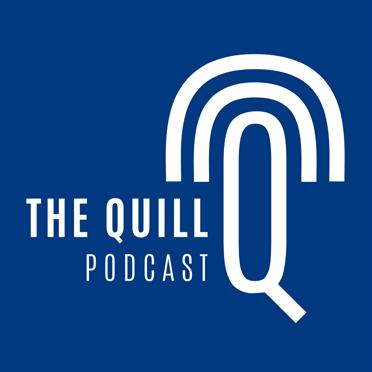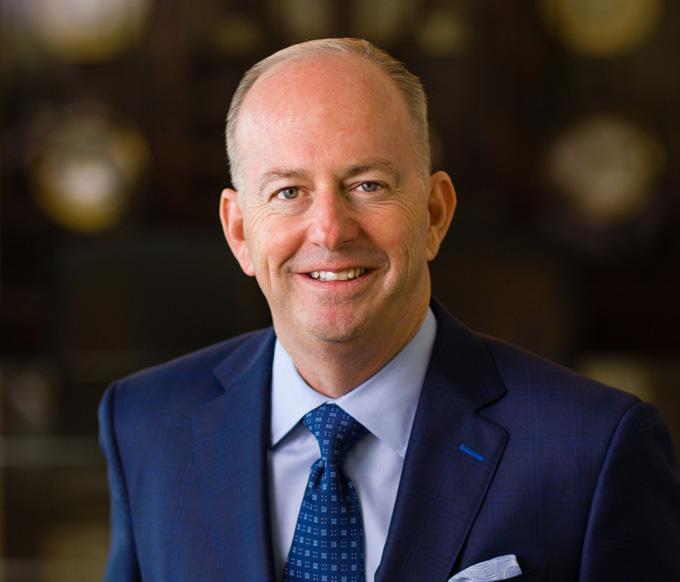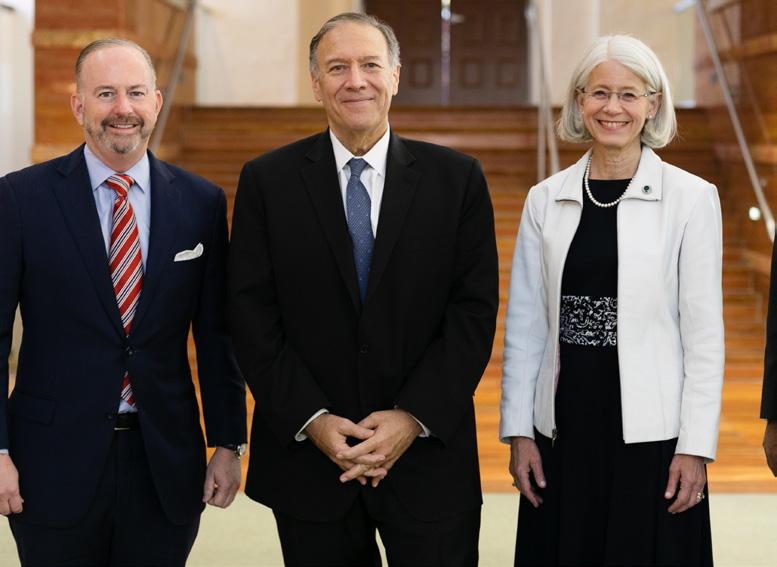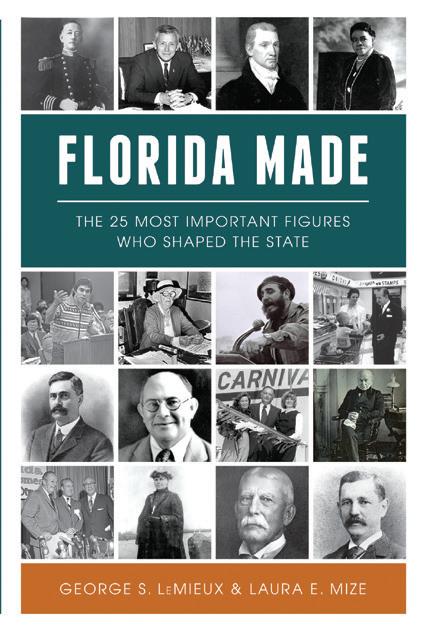
8 minute read
From the desk of Senator LeMieux
This edition of The Quill is a very special one because 2023 marks the 10th anniversary of the LeMieux Center for Public Policy. It is hard to believe that a decade has passed since the Center began The Center’s genesis originated through a convergence of opportunities.
As my time as U.S. Senator from Florida was concluding, I had assumed that all the papers associated with my term in office were the property of the Federal government. But to my surprise, I was told the papers were mine to dispose of as I saw fit.
Advertisement
At about this time, I was approached by the former president of Palm Beach Atlantic University, Bill Fleming, who proposed housing these papers at the university as part of a larger center for public policy. This arrangement would reflect my desire for a forum to promote civil discourse on issues of local, state, national and international importance, something I thought was greatly needed then and now. With the university’s full support, the LeMieux Center was inaugurated as a new Center of Excellence at Palm Beach Atlantic University in 2013.
One of the first areas we wanted to develop was a speaker series that was open to the public and free of charge. This has become our flagship program to provide a forum and opportunity to discuss pressing policy with nationally recognized thought leaders. Over the years we’ve hosted notable speakers ranging from former heads of state, governors, senators, cabinet members and supreme court justices.
A second initiative of special importance has been the Freidheim Fellows Program. Every year, two outstanding students are selected from Palm Beach Atlantic University to research topics of international or domestic concern. Each student is mentored by a faculty member who is a specialist in a particular area. I also work on a regular basis with each student.
In the Fall, the students present their papers at a public event. The quality of the students’ work has been outstanding, demonstrating how the LeMieux Center inculcates our founding ideals in the coming generation. I want to give special thanks to Cyrus and Mitzi Freidheim for endowing this program.
Each quarter the LeMieux Center publishes The Quill, which you are reading now. Available free of charge, each issue covers in detail an important policy issue written by experts in their respective fields. We have featured articles on American foreign policy, the Dobbs decision and religious freedom. Supplementing this publication is the Quill Podcast, during which we interview individuals who contribute and express the type of thoughtful, reasoned, and civil discourse that we seek.
The LeMieux Center’s online presence remains an important part of getting our message out to the public. Not only do we have a website where we can post information, including past copies of The Quill and our podcast, but we also publish content to social media, such as Instagram and Facebook. These events and activities at the LeMieux Center have been guided by the leadership of Dr. Robert Lloyd, who is the Center’s Executive Director. He has a strong background in the policy world, having worked not only in Washington, DC, but in such diverse places as Mozambique, India, Argentina and Nigeria. He has assembled a team that is committed to extending the reach of the Center and including more individuals in this common task of civil discourse on pressing public policy issues. I hope you will join us in this vision.
George S. LeMieux U.S. Senator & Founder of The LeMieux Center for Public Policy
www.lemieuxcenter.org
Last year, Senator LeMieux and Dr. Robert Lloyd launched The Quill Podcast — the official podcast of The LeMieux Center, in which they tackle conversations of consequence to the political, economic and social realms. Listen and follow today on Spotify and Apple Podcasts: go.pba.edu/quill-podcast

Advisory Board
Jim Burns, Kohlberg Kravis Roberts & Co.

James Donnelly, Castle Group
Mary Jo Finocchiaro, InnFact Advisors, LLC
Frances Fisher, Dedicated Volunteer
Mitzi Freidheim
Dedicated Volunteer
Dru Hammer, Hammered Heart Foundation
Margie Helmholdt, Dedicated Volunteer
James W. Holton, Hall Booth Smith, P.C.
James C. Jenkins, Esko, Inc.
Josh Kellam, The Garcia Companies Senator George S. LeMieux Gunster
Dr. Robert Lloyd, Executive Director, LeMieux Center for Public Policy, Loreen Beisswenger Farish Chair for Political Thought, Palm Beach Atlantic University
Michele Merrell Merrell Consulting Group
Mario Murgado, Brickell Motors
Joe Negron GEO Group, Inc.
Beth Neuhoff, Neuhoff Communications
Dr. Robert E. O’Neil Dedicated Volunteer
John Radtke, BioStem Life Science
J. Kimble Vardaman Ratliff, Jr., Southwood Family Holdings, LLC
Richard Reikenis, Reikenis & Associates, LLC.
Brad Saft, EverBright Media
Karl H. Watson, Jr.
7W Capital
In a challenged world, we often forget how fortunate we are to be Americans. A global pandemic, war in Europe, economic hardship, and political division cloud our view. As the new year begins, it is worth reflecting on what makes America special.
What are the core tenets of American prosperity—the ingredients that have made us the freest, most prosperous nation, not only in the world today, but in the history of the world? What are those factors that make us so special?

First, we are a nation and government founded on the principle that our rights come from God, that they are self-evident, and that they belong to the people— not to a king, not to a ruler, not to any government.
Franklin, wrote in our Declaration of Independence:
We hold these truths to be self-evident, that all men are created equal, that they are endowed by their Creator with certain unalienable Rights, that among these are Life, Liberty and the pursuit of Happiness.
That statement of purpose became the polestar of our constitutional republic. It transformed what we would become. It changed the world.
Tom Rooney , Congressman & LeMieux
Senior Fellow
In the summer of 1776, in a small upstairs apartment at 700 Market Street in Philadelphia, Thomas Jefferson, with the help of John Adams and Benjamin
The notion of government by the people and for the people was unknown in the late eighteenth century, and it is still a rarity today. What our founders created was a government set up for your freedoms, your security, for your pursuit of happiness—not the happiness of a duke, baron, or queen—but for you.
Ours is a civil-liberty-driven government where you consent to be governed but demand in return the freedom to worship, the freedom of speech, the freedom of assembly, the right to due process. This is what makes us special. This is our secret sauce. Democracy alone is not enough. Democracy alone can lead to tyranny. Venezuela had a democracy. Democratic elections brought the Muslim brotherhood to power in Egypt. It is our civil liberties that set us apart. The second core tenant of American prosperity is a democratic republic with separation of powers, checks and balances, and federalism—to prevent tyranny of the majority or the minority.
We often bemoan divided government. Especially when the party of our choosing is in power. Divided government is frustrating—and that is how our founders intended it. They wanted to put restraints on democratic passion. From the beginning, the government was divided between an executive, a congress (itself divided in two), and a judiciary. Only the House was elected directly by the people. Now the Senate is as well.
George Washington is said to have told Jefferson that the framers created the Senate to “cool” legislation coming from the House just as a saucer was used to cool hot tea. And while the Senate is now directly elected, the filibuster and its requirement that sixty senators agree on most issues acts as that restraint.
Our founders also separated the federal government from state and local governments to allow local control and to enable each to be an experiment of democracy. Federalism also grants Americans the power to “vote with their feet.” If they do not like the leadership style of New York or California or New Jersey, they can move to more agreeable political and economic climates.
The third core tenet of American prosperity is the rule of law and an independent judiciary. A nation not governed by men and women, but by laws. Laws that apply to every man and woman no matter their station or rank. From the President of the United States to everyday Americans, the courts are entrusted to be impartial and fair.
When President Truman, during the Korean War, ordered the steel mills of this country nationalized before an impending strike, his executive order was struck down by the Supreme Court ruling that he lacked the authority. The world was astounded that a president could not just get his way, especially during a time of war. The Courts imposed their will and upheld the rule of law over the most powerful man in the world. The same man who had ordered the use of two nuclear bombs to end World War II was still governed by the rule of law.
The fourth core tenet of American prosperity is a love of freedom and an ethos of charity. We are the only nation in the history of the world that fights wars to liberate, not to conquer; to emancipate, not to enslave. Who comes to the aid of victims around the world? Who uses its military to rescue and comfort almost as much as it does to fight? Only the United States.
We are also the most charitable people on earth—in our giving, and in how we treat our defeated enemies. Judge America not by its longstanding friendships, but by its former adversaries—Germany and Japan. Today, these are two of our best allies.
Finally, the fifth core tenet of American prosperity is our system of free enterprise and capitalism. This is the ingrained belief that creativity, passion, and hard work should be rewarded and celebrated. That those who succeed should not be torn down but held up as an example for others to imitate. We believe everyone should be given the chance to try, and fail, and try again.


The Protestant work ethic has given us an explosion of innovation and entrepreneurship, a system that has brought us the marvels of modern technology. These range from the smartphone to the internet, from cures for cancer, heart disease, and cystic fibrosis, to men on the moon, shooting a rocket into an asteroid to change its path, and in the not-too-distant future, men and women on their way to Mars.
President Eisenhower told us that “without free enterprise, there can be no democracy.” Capitalism provides ladders up for citizens. Free markets enable anyone to achieve prosperity. Unlike many nations, we have no aristocracy. Today’s winner may be tomorrow’s loser, but tomorrow’s winner may be, and can be, any one of us. Jeff Bezos is the son of a Cuban immigrant. Barak Obama is the son of Kenyan economist. Anyone can prosper in this country if they work hard and pursue their dreams.
As President Reagan told us “Free enterprise has done more to lift people out of poverty than any governmental program.” What has it done for Florida? A government program didn’t create modern Florida. Henry Flagler and his railroad did, and the cities that he recreated or founded along the way from St. Augustine to Palm Beach to Miami. Even more amazing, Flagler did the impossible by connecting an island 90 miles offshore of Florida when he built his railroad to Key West.
Walt Disney also created modern Florida. His vision made Orlando now the most visited tourist destination in the world—over 75 million visitors a year.


These weren’t government programs. They were great Americans who achieved their dreams. My friend Senator Marco Rubio likes to say that more companies have started in this country as zoning violations—in garages and spare bedrooms—than in any other nation on earth!
Now Florida sits at the crossroads of a hemisphere, the bridge between North and South, the Capital of the Americas. The third most populous state, and in the next twenty years the most important, a super economic engine and gateway to another continent.
Because of these core tenets, America is the freest and most prosperous nation on earth. We are that shining city on the hill that Reagan spoke of. We are that last best hope for man that Lincoln spoke about. We are that nation upon which God shed his grace.
May God continue to bless the United States of America.

